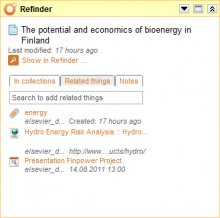Refinder won second price! Elsevier announced the Winners of the Apps for Science Challenge!
 Leo Sauermann on Tue, 11/01/2011 - 16:40
Leo Sauermann on Tue, 11/01/2011 - 16:40 Elsevier, the world-leading provider of scientific, technical, and medical information products and services, today announced the winners of the "Apps for Science" challenge, an international competition challenging software developers to create customized applications that can enhance information search and discovery for researchers. We took part in this challenge and the Refinder-SciVerse application won the second price and USD 10.000!
Our submission to this challenge is an integration of Refinder and SciVerse. Refinder helps scientists to communicate about their research and organize their own collections of related work. When you found the right papers on SciVerse, bring them together with Refinder. Refinder is an intelligent online collaboration tool for teams, it also works on itself. But in combination with SciVerse, scientists can use it to collect papers, research notes, and more information in one place. Once collected, important facts about documents can be added as comments. By using links, related things are connected. When reading an article in SciVerse, an intelligent algorithm automatically searches and suggests relevant collections, topics, documents, or experts from Refinder.
We submitted together with one of our scientific parents, the German Research Center for Artificial Intelligence DFKI. The ideas of Refinder were born at the Knowledge Management Department of the DFKI. In scientific work, collecting and keeping information is a core task. We experienced that individual scientists create information collections and categorize them by topic or project. As a group, researchers do the same. The trick of our "semantic social approach" in Refinder is to let individuals organize their information from different sources in a flexible manner - by topic, project, person or other natural organizing schemes that people usually deploy. This individual freedom given to the individual researcher does not conflict with a group communication, given that a flexible model like Refinder's collections exists.
Winning this competition opens a new market for Refinder: the 15 million users of SciVerse. Together with the USD 10.000 price money, this enables us to take the next steps. The Winners of the top three prizes were determined by a panel of judges comprised of distinguished researchers, engineers, educators and venture capitalists in the field of science, media and technology.
"We at Gnowsis want to thank the judges for their vote for Refinder. We see that our vision and approach of semantic social software appeals to a greater audience. Science is indeed a social endeavour and we will to continue our effort of supporting scientific teams in their research. I also want to thank our CTO Bernhard Schandl and our whole team for making this possible and our partner DFKI for their great support."
Leo Sauermann, CEO
Elsevier has published a statement from Rafael Sidi, Vice President Product Management, Applications Marketplace and Developer Network:
"We thank all the creative developers who answered our call for innovative applications. We are impressed with the ingenuity and innovation displayed in the development of applications for the Apps for Science challenge and are very pleased with the scientific community's engagement in building solutions that would help researchers globally."
The winning apps include productivity and time-saving tools, visualizations of search results or author data and social add-ons enabling collaboration:
- Grand Prize ($15,000): Altmetric, developed by Euan Adie, measures the attention that scientific articles receive via social media and online news sites, then adds the data to ScienceDirect & SciVerse Hub article and search result pages.
- Second Prize ($10,000): Refinder, developed by Bernhard Schandl and Leo Sauermann, adds personal information management and social functions to SciVerse, including the ability to add comments to articles, place multiple papers in a collection and share comments with co-workers.
- Third Prize ($5,000)/Popular Choice Prize ($5,000): iHelp, developed by Mourougane Arumugam, enables researchers to search in their native language and retrieve articles using multi-lingual search.
- Two apps received honorable mentions: the Keyword Optimizer, developed by Scott Fortmann-Roe, helps to find the best set of keywords possible, and ChemDetect, developed by Keming Labs, an app for chemists to quickly scan an article for chemical names and draw full structures.
Elsevier is the world-leading publisher of scientific, technical and medical information. They have opened their vast catalog of scientific content and provided APIs that enable developers like us to create apps that improve researcher productivity and workflow. Elsevier’s trusted content and meta-data integrates more than 10 million full text articles from over 2,500 journals and 11,000 books as well as over 42 million abstracts, citations and web content covering 18,000 titles from over 5,000 publishers.
Sources:

